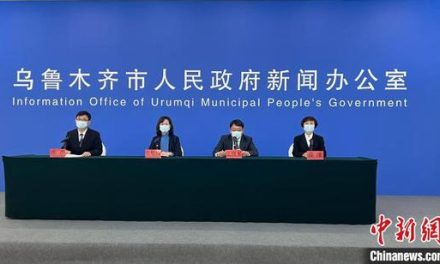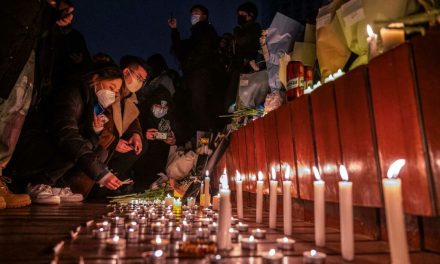By Jianli Yang & Lianchao Han
 Last month in Poland during his much-anticipated speech on the Russian invasion of Ukraine, President Joe Biden said Vladimir Putin “cannot remain in power.” Biden’s aides quickly walked back the statement, claiming the president was not calling for regime change. But our belief is still that he was expressing his true desire that Putin would no longer rule Russia, a sentiment that many other democratic leaders probably share. “The words of a president matter,” Biden has said more than once.
Last month in Poland during his much-anticipated speech on the Russian invasion of Ukraine, President Joe Biden said Vladimir Putin “cannot remain in power.” Biden’s aides quickly walked back the statement, claiming the president was not calling for regime change. But our belief is still that he was expressing his true desire that Putin would no longer rule Russia, a sentiment that many other democratic leaders probably share. “The words of a president matter,” Biden has said more than once.
But the democratic world’s wish for Putin to collapse will likely be frustrated by Beijing’s next strategic move in the unfolding crisis.
After Biden’s nearly two-hour videocall with Xi Jinping on March 18, the media widely believed that the US had obtained two bottom-line commitments from China: no military aid to Russia and no economic aid to Russia in direct violation of the United States-led economic sanctions. Even if China maintains these two commitments, they do not indicate an essential shift from its refusal to condemn Russia’s aggression and call it an invasion or even a war. Indeed, the Chinese Communist Party (CCP) continues to criticize the West for cornering a nuclear power, and continues to denounce the international community’s economic sanctions against Russia.
Many mistakenly believe that this Xi-Putin strategic alliance has been cringeworthy for Xi in the wake of Russia’s failure to take Ukraine as planned and has even left him in a strategic dilemma. Indeed, Xi and Putin both miscalculated, and the misjudgment was somewhat alarming to Xi for a while. However, Xi’s embarrassment was only moral, as he was caught on the wrong and losing side of history. Yet, this can hardly be equated with a strategic loss or a strategic dilemma. In fact, Xi has quickly fine-tuned and refined his strategy. After all, his alliance with Putin is based on an overarching strategy that he has pursued for years.
The notion that Xi and Putin will not become closer because of the longstanding geostrategic conflict of interest between China and Russia is misguided. There is an old Chinese saying, “He who does not have distant worries must have near concerns.” Beijing and Moscow share a common “near concern”—the former believes that the US is containing its rise while the latter believes that the US is threatening its security. But China and Russia’s real intentions are to dominate the world and restore their past glory, which necessitates that they weaken America’s power and create a new world order. Therefore, China and Russia are far more likely to collude together than contest each other.
In the past few years, democratic states have gradually awakened to the CCP’s nature and its threat to the international order of freedom, democracy, and the rule of law. So these countries have begun to overcome various difficulties to come together and counter China. A new cold war seemed imminent. Correspondingly, the CCP has successfully transformed one of the pillars of its legitimacy—nationalism—into anti-Americanism. But knowing that it does not yet have the capacity to engage in a full-scale confrontation with the democratic world, the CCP has deliberately sought to avoid a cold war while continuing to exploit democracies’ markets and technologies and while seeking to weaken the United States. At this moment, Putin’s ambition to invade Ukraine emerged and played into Xi’s hands.
Xi mistakenly envisioned that Putin’s invasion of Ukraine would result in a quick success and would alter the world landscape in both Europe and East Asia. Xi did not want to see Putin stuck in a quagmire, but in terms of overall strategy, it may not be a loss for Xi. On the contrary, it may even benefit his regime if Putin remains in power, even if he loses the war. So far, the war demonstrates that Russia is no longer a world superpower. A post-war Russia ruled by Putin would be a much weaker nuclear country, which would be in China’s best long-term interest. Such a weakened nuclear power would not be able to challenge China’s geostrategic interests for many years or even generations to come, but it would be able to cause trouble for the US-led democratic world and distract it from effectively responding to China’s expansion. Think of the diplomatic benefits a nuclear North Korea has brought to China over the past decades.
Xi understands well that if Putin’s regime falls, China will lose an important bulwark. Because of the fundamental values disparity between China and the democratic world as well as the strategic and economic competition, the CCP will inevitably become a direct protagonist on one side of a new cold war, prematurely bringing China into a full confrontation with the democratic world. Russia’s war against Ukraine has united the democratic world, and people around the globe are rebuilding their faith in democracy. Xi will certainly feel this force. Therefore, his next strategic move vis-à-vis Russia’s invasion of Ukraine will likely be to adopt a more “neutral” stance, including a cautious approach to US warnings, to make the international community recognize China’s potential role as a mediator that could be vital in ending the war, even if it entails preserving Putin’s dictatorial power.
While the failure of Putin’s invasion of Ukraine may cause Xi to rethink an armed reunification with Taiwan, judging from his behavior since coming to power, we believe that a Xi-led invasion of Taiwan is almost inevitable. Xi has vowed to annex Taiwan, which he describes as the CCP’s “historic mission” and an “unshakable commitment.” And he has ordered the Chinese military to accelerate war preparations. Xi’s determination is, in part, based on his assessment that the “East is rising and the West is declining.” He believes that with Putin’s Russia as a barrier to distract the declining West from confronting Beijing, China can join with Russia, Iran, and even Saudi Arabia to weaken the hegemony of the US dollar; quickly catch up with or even surpass the US in high tech, economic volume, and energy and food reserves; and realize its ambition for Taiwan’s reunification of the motherland in the not-too-distant future. He will also bet that democratic world will not be as united in facing China as it is now in facing Russia. After all, China is the largest trading partner of more than half of the world’s countries, and can certainly exert much greater global economic influence than Russia; think of the West’s responses to China’s ongoing atrocities against religious minorities.
To be clear, prior to the outbreak of Putin’s invasion of Ukraine, there was no external threat to Russia’s national security. Even if Ukraine became a NATO member, Russia would not be subject to a military attack by any country. Putin invaded Ukraine because of his egoistic expansionist ambitions, coupled with the threat to his dictatorship posed by Russian civilians (who have witnessed the gradual success of neighboring Ukraine as a thriving democratic nation-state) demanding democratic freedom. It is in these respects that Xi’s motives parallel those of Putin.
In short, Putin and Xi are colluding to reverse the democratic gains made by the world following the fall of the Berlin Wall and to destroy the liberal international order. Russia’s invasion of Ukraine is a dangerous action in which the two dictators are conspiring to change the global landscape and establish their tyrannical dominance in a new world order.
The crisis in Ukraine has taught the democratic world a grave lesson: appeasement of tyrannical dictators will inevitably wreak havoc around the globe on the ever-fragile state of freedom, democracy, and rule of law. It could even threaten the entirety of human civilization in the case of nuclear war.
There will be many more struggles between China and the US-led democratic world around the Russia-Ukraine war, and one of the focal points will be the fate of Putin. The democratic world must have a visionary plan to end the war in a way that would lead to the end of Putin’s dictatorship in Russia; otherwise, the world will suffer severe and endless consequences. For this reason, a minimum insistence is that Beijing should not be a mediator in ending the war, as the CCP has disqualified itself by being “on the wrong side of history.” More importantly, the international community cannot afford to allow Xi to bail Putin out and give China another “period of strategic opportunity.”
At the same time, the US must unequivocally continue its full commitment to defending Taiwan’s democratic autonomy. As one of us argued on these pages, the American policy of “strategic ambiguity” regarding Taiwan might have served a purpose in the past, but as the CCP’s ambition to invade Taiwan becomes increasingly apparent, the US must abandon its policy of strategic ambiguity and replace it with one of strategic clarity, especially in light of Putin’s brazen invasion of Ukraine.
Last but not least, the US and her allies must develop a plan to disclose the hidden offshore assets of members of China’s ruling class and political families (including Xi’s family) and be ready to freeze these assets at any time in response to Beijing’s actions or inactions on Ukraine and Taiwan. This may prove to be the most effective deterrent.
This article first appeared in Providence on April 27, 2022.




















